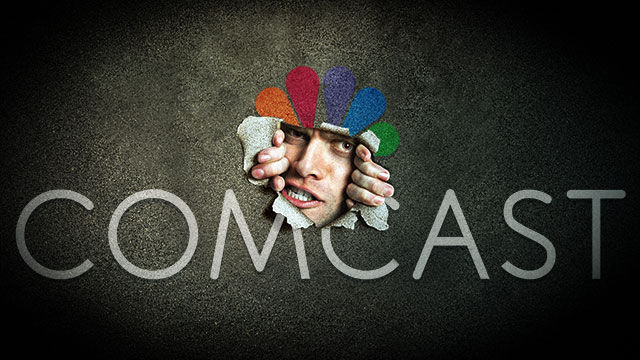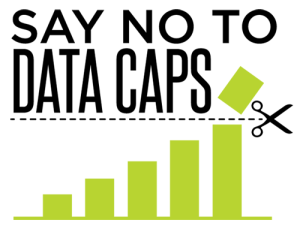
Comcast, the nation’s largest cable company and home Internet service provider, has a lot of angry customers. And instead of just privately fuming, thousands of them have complained to the Federal Communications Commission (FCC).
The deluge of angry customers is so big that the FCC gets more Internet service complaints about Comcast than it does for AT&T, Verizon, and Time Warner Cable (TWC) combined.
We’ve written about complaints filed against Comcast before, but we also wanted to find out how those complaints compared to Comcast’s top rivals. So we filed a Freedom of Information Act request with the FCC, seeking information on three major types of Internet provider complaints: availability, billing, and speed.
In those categories, Comcast received 11,812 complaints so far this year (from January 1 to November 9). AT&T got 3,896 such complaints, Verizon got 1,588, and TWC had 1,240. In total, AT&T, Verizon, and TWC received 6,724 such complaints—5,000 fewer than Comcast alone.
Comcast gets complaints about many things, but frustration with its 300GB-per-month data cap and its overage charges appear to drive much of the most recent outrage. (AT&T also imposes data caps ranging from 150GB to 1TB a month, but the 150GB cap on entry-level DSL is reportedly the only one that's enforced. Verizon and TWC don't limit data usage as strictly as Comcast.)
The “300GB data cap that Comcast is placing on households is ridiculous and they know it,” one Acworth, Georgia, resident wrote to the FCC in a complaint echoed by many others. “I haven't gone a single week without going over the limit and I need the bandwidth for my job as a video editor.”
It isn’t surprising that Comcast received the most complaints, since it’s the largest ISP in the US and has regularly ranked at or near the bottom of its industry in customer satisfaction. Comcast also is the subject of much negative media coverage and attention from consumer advocacy groups, which may encourage more customers to file complaints.
Whatever the reason, it’s clear Comcast receives far more complaints on a per-customer basis than do other top ISPs. Comcast has 22.9 million broadband subscribers, compared to 15.8 million for AT&T, 13 million for TWC, and 9.2 million for Verizon, Leichtman Research Group reports.
For wireline broadband, that means AT&T, TWC, and Verizon have a combined 38 million customers—about 15 million more than Comcast, even though the three firms together receive far fewer complaints.
Moreover, the AT&T complaint data is inflated a bit because the telco offers mobile broadband in addition to home Internet service. Consumers can file complaints against cellular carriers under a separate category that’s just for phone companies, but some choose to file their mobile complaints through the Internet service category. Complaints about AT&T’s throttling of unlimited mobile data plans and other problems with wireless service have thus added to AT&T’s total complaint numbers. (Verizon’s mobile complaint numbers aren’t inflated as much as AT&T’s because Verizon's cellular service is sold through its Verizon Wireless subsidiary. There were 559 complaints against Verizon Wireless in our data set, separate from the 1,588 filed against Verizon’s FiOS and DSL home Internet services).
No matter how you slice it, Comcast gets more complaints than you would expect based on its subscriber numbers alone. Despite the added complication of its mobile subscribers, AT&T still received just one-third as many Internet service availability, billing, and speed complaints as Comcast.
In addition to overall complaint numbers, Ars obtained the text of complaints over a five-week period from September 24 to October 30. Let’s take a look at some of them. (You can find the entire data set here.)
Comcast customers hate data caps, but that’s not all they hate

Billing complaints are where data caps come in. Lots of people are mad that they had unlimited data when they first subscribed to Comcast Internet service, only to later be limited to 300GB a month. Customers must pay $10 overage fees for each additional 50GB or $30 extra each month for unlimited data.
Comcast hopes to prevent people from using alternatives to cable TV like Netflix, and it wields too much power over consumers because it's often the only viable broadband choice, numerous complaints say. Some customers say they now closely monitor their Internet usage and restrict big downloads and online streaming in order to stay under their caps.
Many complaints also questioned the accuracy of Comcast’s data meters. We recently wrote about a different customer who proved that Comcast had inaccurately accused him of going over his data cap. Comcast admitted the mistake, but the company still maintains that its meters are accurate overall.
While most complaints only suspected that the metering was wrong, some customers claimed to have proof.
“As of writing this they currently place us at 271GB of 300GB (according to their online meter) used for the month of September,” wrote a customer in Richmond Hill, Georgia. “However, our FreeBSD router tracks the total data used (outgoing or incoming) on WAN and only reports a total of ~147.054GB (139.93GB DL / 7.12GB UL) consumed in the same time period. There appears to be a huge discrepancy between what Comcast reports and what is actually being consumed.”
Here are a few more Comcast customer complaints about data caps (names redacted, customer locations in bold):
Doral, Florida: "Comcast is now introducing a data cap for Internet services which I believe is a punishment for customers who solely choose Comcast as an Internet service provider and not as a cable TV or telephone service provider. They are trying to discourage users who prefer streaming their television shows through services like Netflix, Hulu, Amazon, etc…. Comcast already has an awful reputation with providing inconsistent service at questionable rates, and for most people (myself included), we are limited in our choices for internet service providers."
Knoxville, Tennessee: "We are a family of 2 adults and 1 toddler. We ordered the 75Mbps speed Xfinity Internet from Comcast. In one month, we have already exceeded the 300GB cap. In this day and age of gaming, news via the Web, family time, business, online school, having a data cap that low for an Internet speed of 75Mbps is ridiculous. It seems like I cannot even watch a video of my son without blowing through the cap and without my service going out. Caps this low should be illegal especially with no competition.
There is no competition in our neighborhood in Knoxville (a suburb, not rural) that provides cable service so we are stuck with Comcast."
Parkland, Florida: "Comcast has recently imposed a data cap of 300GB per month for my account. They have been showing data usage over 300GB per month over the past few months. This is incorrect. I have logs set up on my own router which monitors all traffic in and out of the house. My own monitoring shows that I am always 80-100GB lower per month than what Comcast reports. Comcast website does not provide any details of how they come up with this usage data."
Nashville, Tennessee: "Comcast just surprised me with a bill that shows that I owed $180 for over cap surcharges. I called the same day I got the bill, and they also let me know that I owe another $220 for over cap surcharges. (That's right, a surprise $400). All I have been doing for the most part is watching Netflix, so it appears there was some kind of data problem going on that I was entirely aware of."
Cumming, Georgia: "On 9/30 around 9:00 PM EDT I checked my Xfinity data usage meter. I had 268GB of 300GB left, so I decided to start a 22GB download to get it in before the meter reset for October. I finished my download and went to bed only to find the next day my October meter said I had used 22GB already. This is impossible for me to have done from midnight until 8 AM EDT while asleep, so I contacted chat support… [The customer service agent] informed me that Comcast operates at Universal Time. He struggled to explain what time it is compared to my own time zone, but that's their time… I use a lot of data, I've already scaled back Netflix to medium quality streaming to control my data. Starting 22GB in the hole, when I thought I had everything under control based on the tools and information provided, is very frustrating."
White House, Tennessee: "I have called Comcast multiple times in regards to my very low Internet speeds. I pay for 75Mbps download, and on a good day I am lucky to receive an average of 10Mbps. Somehow with these very low speeds I have also managed to 'exceed my monthly data cap' of 300GB. My normal $60/month bill has now turned into $90 for an additional 150GB... If there was another broadband option in my area, I would gladly switch in a heartbeat... but currently there are none."
Complaining to the FCC can help customers get a lower bill or prod an Internet provider into solving the problem. The FCC forwards complaints to Internet service providers, which are required to respond to the commission and to the customer within 30 days.
Complaints can sometimes lead to FCC investigations, but in most cases they are simply a way for customers to pressure ISPs when they believe a problem isn’t being addressed properly.
In response to the data cap complaints, Comcast issued the following statement to Ars:
"We are conducting data trials in select markets around the country, covering a small percentage of our customers. We designed the various plans we are trialing with a minimum 300GB/month data plan because more than 90 percent of our customers use less data than that and are not affected. The trials are providing us with invaluable consumer feedback. For example, we surveyed our heavy data users and 80 percent thought our data trials were fairer than our past approach, which was a 250GB/month static cap. It’s important to note that 10 percent of our customers are consuming nearly 50 percent of all the data on our network. As a result, these trials are based on the principle that those who use more, pay more and those who use less, pay less.”
reader comments
319